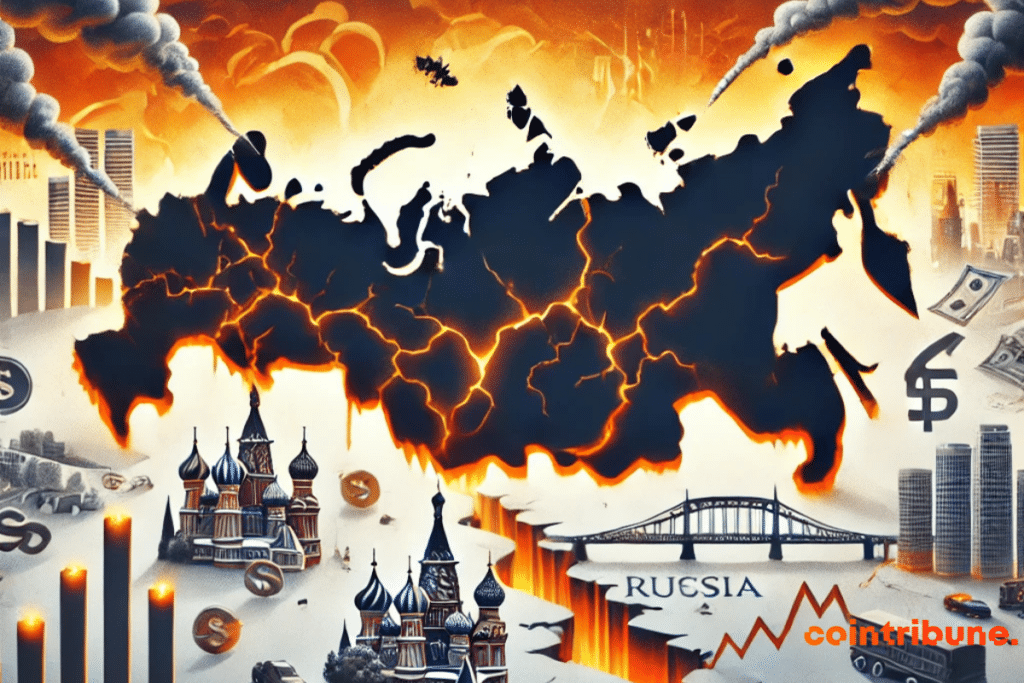Russia Is Approaching Economic Disaster!
Russia, although resilient in the face of Western sanctions, seems to be sliding down a slope. Supported by a flourishing war economy in 2024, the country could see its efforts crumble as early as the following year. The International Monetary Fund (IMF) indeed forecasts a severe slowdown in 2025, as the Russian machine, long driven by military orders, risks running out of steam.

Resilience in 2024, but for how long?
For the year 2024, the Russian economy still seems solid. The IMF has raised its growth forecasts for the country to 3.6%, supported by massive military spending.
This third year of war in Ukraine has stimulated the military-industrial complex, offering Russia a facade of prosperity. However, this growth, although significant, does not mask the signs of imminent exhaustion.
The explosion of public orders has created a market overheating, leading to an already perceptible inflationary cycle.
The Kremlin, despite its victory speech on sanctions, will not be able to escape the long-term impact of this situation.
The IMF anticipates a slowdown in growth in 2025, falling to 1.3%, a figure that reflects the end of an artificial expansion cycle.
It is no longer a question of “if”, but “when” the Russian economy will start to collapse under the weight of its own policies.
Russia: Inflationary spiral and labor shortage
One of the main reasons for this slowdown is the soaring inflation. Massive spending in the war effort has exacerbated pressure on prices.
By injecting billions into the military-industrial complex, Moscow has inadvertently created a bubble. Resources are becoming scarcer, wages are increasing, and with inflation already reaching 8.6% in September, the Central Bank of Russia (CBR) is forced to raise its key interest rates, currently at 19%.
But the real time bomb lies in the labor shortage. With hundreds of thousands of men sent to the front or fleeing abroad, Russia faces a critical shortage of workers.
Even Vladimir Putin had to publicly acknowledge this problem, admitting that historically low unemployment is becoming a hindrance to economic growth. This situation can only deteriorate in 2025, making the IMF’s forecasts all the more credible.
The war economy, a long-term trap
By relentlessly injecting into the war effort, the Kremlin risks finding itself trapped in an unsustainable economic model.
Russia has, of course, managed to circumvent some sanctions and reduce its dependence on hydrocarbons, but at what price? The country’s economy is now dependent on its own military expenditures. This strategy, which seemed effective in the short term, could turn against it in 2025.
The announced 30% increase in military spending for 2025, planned by the Russian government, will only fuel the inflationary spiral in which the country is already caught.
Even more concerning, it risks widening the gap between public investments and the actual needs of the population.
By continuing to bet on a war economy, Moscow could very well plunge the country into a large-scale economic crisis, the first signs of which are already visible.
Inflation, labor shortages, and excessive dependence on the war effort foreshadow an economic disaster for the country. In the meantime, India and China absorb 78% of Russian oil.
Maximize your Cointribune experience with our "Read to Earn" program! For every article you read, earn points and access exclusive rewards. Sign up now and start earning benefits.

Fascinated by Bitcoin since 2017, Evariste has continuously researched the subject. While his initial interest was in trading, he now actively seeks to understand all advances centered on cryptocurrencies. As an editor, he strives to consistently deliver high-quality work that reflects the state of the sector as a whole.
The views, thoughts, and opinions expressed in this article belong solely to the author, and should not be taken as investment advice. Do your own research before taking any investment decisions.